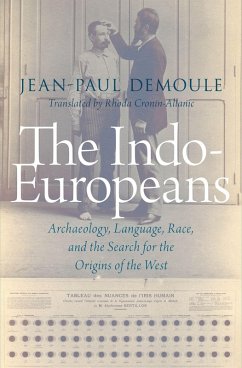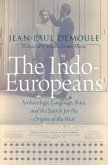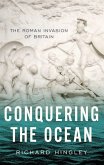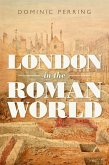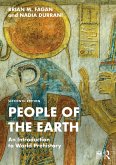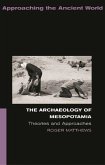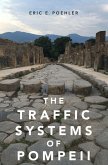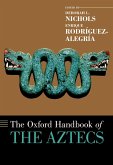The Indo-Europeans (eBook, PDF)
Archaeology, Language, Race, and the Search for the Origins of the West


Alle Infos zum eBook verschenken

The Indo-Europeans (eBook, PDF)
Archaeology, Language, Race, and the Search for the Origins of the West
- Format: PDF
- Merkliste
- Auf die Merkliste
- Bewerten Bewerten
- Teilen
- Produkt teilen
- Produkterinnerung
- Produkterinnerung

Hier können Sie sich einloggen

Bitte loggen Sie sich zunächst in Ihr Kundenkonto ein oder registrieren Sie sich bei bücher.de, um das eBook-Abo tolino select nutzen zu können.
The existence of an Indo-European linguistic family, allowing for the fact that several languages widely dispersed across Eurasia share numerous traits, has been demonstrated for several centuries now. But the underlying factors for this shared heritage have been fiercely debated by linguists, historians, archaeologists, and anthropologists. The leading theory, of which countless variations exist, argues that this similarity is best explained by the existence, at one given point in time and space, of a common language and corresponding population. This ancient, prehistoric, population would…mehr
- Geräte: PC
- mit Kopierschutz
- eBook Hilfe
- Größe: 51.41MB
![The Indo-Europeans (eBook, ePUB) The Indo-Europeans (eBook, ePUB)]() Jean-Paul DemouleThe Indo-Europeans (eBook, ePUB)24,95 €
Jean-Paul DemouleThe Indo-Europeans (eBook, ePUB)24,95 €![Conquering the Ocean (eBook, PDF) Conquering the Ocean (eBook, PDF)]() Richard HingleyConquering the Ocean (eBook, PDF)11,95 €
Richard HingleyConquering the Ocean (eBook, PDF)11,95 €![London in the Roman World (eBook, PDF) London in the Roman World (eBook, PDF)]() Dominic PerringLondon in the Roman World (eBook, PDF)31,95 €
Dominic PerringLondon in the Roman World (eBook, PDF)31,95 €![People of the Earth (eBook, PDF) People of the Earth (eBook, PDF)]() Brian FaganPeople of the Earth (eBook, PDF)157,95 €
Brian FaganPeople of the Earth (eBook, PDF)157,95 €![The Archaeology of Mesopotamia (eBook, PDF) The Archaeology of Mesopotamia (eBook, PDF)]() Roger MatthewsThe Archaeology of Mesopotamia (eBook, PDF)41,95 €
Roger MatthewsThe Archaeology of Mesopotamia (eBook, PDF)41,95 €![The Traffic Systems of Pompeii (eBook, PDF) The Traffic Systems of Pompeii (eBook, PDF)]() Eric E. PoehlerThe Traffic Systems of Pompeii (eBook, PDF)22,95 €
Eric E. PoehlerThe Traffic Systems of Pompeii (eBook, PDF)22,95 €![The Oxford Handbook of the Aztecs (eBook, PDF) The Oxford Handbook of the Aztecs (eBook, PDF)]() The Oxford Handbook of the Aztecs (eBook, PDF)29,95 €
The Oxford Handbook of the Aztecs (eBook, PDF)29,95 €-
-
-
Dieser Download kann aus rechtlichen Gründen nur mit Rechnungsadresse in A, B, BG, CY, CZ, D, DK, EW, E, FIN, F, GR, HR, H, IRL, I, LT, L, LR, M, NL, PL, P, R, S, SLO, SK ausgeliefert werden.
- Produktdetails
- Verlag: OUP eBook
- Seitenzahl: 512
- Erscheinungstermin: 12. Mai 2023
- Englisch
- ISBN-13: 9780197506486
- Artikelnr.: 67849426
- Verlag: OUP eBook
- Seitenzahl: 512
- Erscheinungstermin: 12. Mai 2023
- Englisch
- ISBN-13: 9780197506486
- Artikelnr.: 67849426
- Herstellerkennzeichnung Die Herstellerinformationen sind derzeit nicht verfügbar.
* The official Indo-European hypothesis: the 12 canonical theses
* OVERTURE
* From the Renaissance to the French Revolution
* 1. The search for a long-anticipated discovery
* The Indo-European golden legend
* Uncertain inventors
* The search for an anticipated discovery
* A recurring discovery
* Why was Leibniz unable to publish in German?
* Schizophrenic Europeans
* The slow secularization of the world
* India, an alternative myth
* FIRST MOVEMENT (FROM 1814 TO 1903)
* All is resolved!
* 2. The invention of comparative grammar
* The search for origins
* On the superiority of (Indo-) European languages
* Comparative grammar, a German science?
* Colonialism as an understanding of history
* August Schleicher and the botany of languages
* The young Turks of comparative grammar
* Other possible models so soon?
* 3. From India to Germania, the return of the wheeled cradle
* The Indian cradle
* An ephemeral Earthly Paradise
* The return of the homeland
* Those who refused to repatriate the homeland
* From texts to objects
* Imaginary communities
* The rise of archeological excavations
* More primitive
* Bathing, kissing and chastity
* Linguistics of absence
* The return to Germania
* Pan-Germanism and anti-Semitism
* Occultist beliefs
* The ambiguities of official linguistics
* 4. The invention of "scientific racism"
* God and the polygenists
* The art of measuring skulls
* From divine right to nation
* The terrors of the "Count" de Gobineau
* A science of man?
* Who are the French?
* On the origins of the Aryans
* Are the Prussians German?
* The three positions of French anthropologists on the Indo-European
question
* Moderation among German anthropologists
* Does "race" exist?
* The Count and the Aryan
* Sex, fantasies and racisms
* The first symptoms of political racism
* The mismeasure of man
* SECOND MOVEMENT (FROM 1903 TO 1945)
* Crimes and errors
* 5. From comparative grammar to linguistics: a language of leaders?
* The ambiguities of Ferdinand de Saussure
* Antoine Meillet, chief and master
* A language of chiefs
* Do you speak a "language of civilization"?
* An instinct for conquest and a love of wide open spaces
* Linguistic sentiment?
* Meillet versus Schuchardt
* The triumph of structural linguistics
* And what if there never had been an Original People?
* 6. From Aryan Pan-Germanism to Nazism
* The methods of archeology
* Kossinna's law
* The Kossinnian Indo-German narrative
* "A pre-eminently German discipline"
* Erasing the memory of Kossinna
* Nazism, one of the possible horizons for the Aryans
* The Atlantis of the Far North
* Sects and secret societies
* Hitler himself was not a believer
* The rallying of archeologists
* SS against SA, and the pillaging of conquered lands
* International cowardice and complicity
* 7. A circling cradle
* "Culture circles" of the European Neolithic
* Uncertain European chronologies
* Childish, not Childeish!
* Regarding the superiority of declensions
* Skulls and words
* The dominance of the Nordic theory
* Eminently respectable universities
* Weaknesses in the Nordic hypothesis
* A die-hard Asiatic cradle
* Excavations in central Asia
* A return to (Eastern) Europe
* The Pontic steppes endure
* Marxism and archeology
* Marr, Stalin and linguistics
* 8. Excesses and crimes of racial theories
* Ordinary racism and institutional racism
* The anthropological dead-end
* Genetics to the rescue
* Eugenics and scientific charlatanism
* The dreams of German geneticists
* From skulls to crimes
* And what of France?
* Those who collaborated
* THIRD MOVEMENT (FROM 1945 TO THE 3RD MILLENNIUM)
* All is re-resolved!
* 9. The Return of the Aryan, pagan, extreme right (from 1945 to the
present)
* A truly "New" Right?
* The "magician" prodromes
* A view from the (extreme) right
* From Gobineau to Konrad Lorenz
* A re-armed extreme right
* The limits of "entryism"
* Contemporary "Aryan" ideology
* A racial "Que sais-je"?
* The "racist" International
* Close collaborations
* 10. From racial anthropology to biological anthropology
* The twilight of the "races"
* Medals and survivals
* From skulls to red blood cells
* A truly new synthesis?
* We have rediscovered the Indo-Europeans!
* Racism by means of psychology and IQ
* 11. What archaeology tells us today
* The first Europeans
* The Neolithic revolution
* Sedentary hunter-gatherers
* The rise of chiefdoms
* What happened on the steppes?
* From the Copper Age to the Bronze Age
* New power networks
* From proto-history to history
* The search for the Indo-Europeans
* 12. Archeology: What if the Indo-Europeans had always been there?
* A nebulous autochthony
* Paleolithic continuity?
* 13. Did the Indo-Europeans really come from Turkey?
* Ex oriente lux
* A new hypothesis?
* The language of the original Homeland
* From Indo-European to Indo-Hittite?
* Part of the family tree of all the world's languages?
* Concerning the difficulties of classification
* The linguistic impacts of agriculture?
* The return of Trubetzkoy
* A non-verifiable model
* How can we rid ourselves of the initial brief
* An incomplete critical approach
* 14. Did the Indo-Europeans really come from the Black Sea Steppes?
* A (very) old hypothesis
* From Vilnius to Los Angeles
* Initial cautiousness
* The return of the steppes
* Feminism and invaders
* A new demonstration?
* A unified and coherent theory?
* The horse, of course and the chariot, naturally!
* Warrior invasions or a vicious circle?
* And what of genetics?
* 15. From prehistory to history: the rediscovered routes taken by the
Indo-Europeans?
* How do we prove a migration?
* The coming of the Greeks
* An early Bronze Age arrival
* Tiles, gray ware and princely tombs
* The arrival of the "Aryans" in India?
* The world of the steppes and national issues
* Invisible migrations and Kulturkugel
* The mysteries of the Tocharians
* Our ancestors, the Celts
* Romans and Italics
* Hittites and Anatolians
* Their ancestors, the Germani
* Slavs or Germani?
* 16. Georges Dumézil, a French hero
* A sense of the epic
* The three functions
* The original texts
* The "Dumézil affair"
* Occupation and occultism
* One College, two Academies and a New Right
* Trifunctionality and Indo-Europeanness
* By excess and by default
* Heritages and heredities
* The unavoidable detour into archeology
* Other mythologists?
* Dumézil and the myths
* 17. Linguistic reconstructions and models in the 21st century
* Discovering original sounds?
* What exactly are we reconstructing?
* Of roots and words
* Thinking in trees
* The tree of all the world's languages
* An apple, a hat and a car
* Measuring the speed of language evolution
* From the tree to the network
* 18. Words and things of the Indo-Europeans
* The dead-ends of linguistic paleontology
* Demonstration by absence
* From words to meaning
* Regarding Indo-Europeanness
* A primordial poetry?
* From words to things, and creating the "impression of reality"
* Indo-European, or universal?
* How to always be right
* FINALE AND 2ND OVERTURE
* 19. Models, counter-models, ideologies and errors of logic: are there
any alternatives?
* How languages change
* Invisible conquerors and secular empires
* Cultures and ethnic groups
* Archeological culture as Nation State?
* Lessons from the barbarians
* Languages and material cultures
* Languages without frontiers
* The inadequacy of trees
* "No language is totally pure"
* Mixes and interferences
* Substrates, adstrates and superstrates
* Pidgins and creoles
* Sprachbund and the Balkan laboratory
* "Areal" linguistics
* The tools of sociolinguistics
* Epilogue
* An alternative vision: the 12 Indo-European antitheses
* Appendices
* 1. Simplified chronological table of the main archaeological cultures
and civilizations in Eurasia (from - 300 000 BC to the present).
* 2. Dates of emergence of the major Indo-European languages.
* 3. August Schleicher's tree of the Indo-European languages.
* 4. The development of the Indo-European languages according to
Gamkrelidze and Ivanov (1985).
* 5. A map of some of the solutions of the Indo-European homeland
problem proposed since 1960.
* 6. Map of the main archaeological cultures defined in the 1930s.
* 7. The Indo-European migrations, after Gustav Kossinna.
* 8. The early historical distribution of the main Indo-European
speaking peoples.
* 9. The neolithization of Europe.
* 10. The spread of Indo-European languages, after Colin Renfrew.
* 11. Spread of Indo-European people, after Marija Gimbutas' theories.
* 12. Map of the Chalcolithic cultures in the 5th millennium BC.
* 13. Map of the Chalcolithic cultures in the 4th millennium BC.
* 14. Map of the Chalcolithic cultures in the 3rd millennium BC.
* 15. Map of the Chalcolithic cultures in the 2nd millennium BC.
* 16. Comparative trees of human genes and language families.
* 17. The Indian linguistic area, after Colin Masica
* 18. Relationships between the Indo-European languages, after Paul
Heggarty
* 19. Relationships between the Indo-European languages, after Alfred
Kroeber
* Bibliography
* Index
* The official Indo-European hypothesis: the 12 canonical theses
* OVERTURE
* From the Renaissance to the French Revolution
* 1. The search for a long-anticipated discovery
* The Indo-European golden legend
* Uncertain inventors
* The search for an anticipated discovery
* A recurring discovery
* Why was Leibniz unable to publish in German?
* Schizophrenic Europeans
* The slow secularization of the world
* India, an alternative myth
* FIRST MOVEMENT (FROM 1814 TO 1903)
* All is resolved!
* 2. The invention of comparative grammar
* The search for origins
* On the superiority of (Indo-) European languages
* Comparative grammar, a German science?
* Colonialism as an understanding of history
* August Schleicher and the botany of languages
* The young Turks of comparative grammar
* Other possible models so soon?
* 3. From India to Germania, the return of the wheeled cradle
* The Indian cradle
* An ephemeral Earthly Paradise
* The return of the homeland
* Those who refused to repatriate the homeland
* From texts to objects
* Imaginary communities
* The rise of archeological excavations
* More primitive
* Bathing, kissing and chastity
* Linguistics of absence
* The return to Germania
* Pan-Germanism and anti-Semitism
* Occultist beliefs
* The ambiguities of official linguistics
* 4. The invention of "scientific racism"
* God and the polygenists
* The art of measuring skulls
* From divine right to nation
* The terrors of the "Count" de Gobineau
* A science of man?
* Who are the French?
* On the origins of the Aryans
* Are the Prussians German?
* The three positions of French anthropologists on the Indo-European
question
* Moderation among German anthropologists
* Does "race" exist?
* The Count and the Aryan
* Sex, fantasies and racisms
* The first symptoms of political racism
* The mismeasure of man
* SECOND MOVEMENT (FROM 1903 TO 1945)
* Crimes and errors
* 5. From comparative grammar to linguistics: a language of leaders?
* The ambiguities of Ferdinand de Saussure
* Antoine Meillet, chief and master
* A language of chiefs
* Do you speak a "language of civilization"?
* An instinct for conquest and a love of wide open spaces
* Linguistic sentiment?
* Meillet versus Schuchardt
* The triumph of structural linguistics
* And what if there never had been an Original People?
* 6. From Aryan Pan-Germanism to Nazism
* The methods of archeology
* Kossinna's law
* The Kossinnian Indo-German narrative
* "A pre-eminently German discipline"
* Erasing the memory of Kossinna
* Nazism, one of the possible horizons for the Aryans
* The Atlantis of the Far North
* Sects and secret societies
* Hitler himself was not a believer
* The rallying of archeologists
* SS against SA, and the pillaging of conquered lands
* International cowardice and complicity
* 7. A circling cradle
* "Culture circles" of the European Neolithic
* Uncertain European chronologies
* Childish, not Childeish!
* Regarding the superiority of declensions
* Skulls and words
* The dominance of the Nordic theory
* Eminently respectable universities
* Weaknesses in the Nordic hypothesis
* A die-hard Asiatic cradle
* Excavations in central Asia
* A return to (Eastern) Europe
* The Pontic steppes endure
* Marxism and archeology
* Marr, Stalin and linguistics
* 8. Excesses and crimes of racial theories
* Ordinary racism and institutional racism
* The anthropological dead-end
* Genetics to the rescue
* Eugenics and scientific charlatanism
* The dreams of German geneticists
* From skulls to crimes
* And what of France?
* Those who collaborated
* THIRD MOVEMENT (FROM 1945 TO THE 3RD MILLENNIUM)
* All is re-resolved!
* 9. The Return of the Aryan, pagan, extreme right (from 1945 to the
present)
* A truly "New" Right?
* The "magician" prodromes
* A view from the (extreme) right
* From Gobineau to Konrad Lorenz
* A re-armed extreme right
* The limits of "entryism"
* Contemporary "Aryan" ideology
* A racial "Que sais-je"?
* The "racist" International
* Close collaborations
* 10. From racial anthropology to biological anthropology
* The twilight of the "races"
* Medals and survivals
* From skulls to red blood cells
* A truly new synthesis?
* We have rediscovered the Indo-Europeans!
* Racism by means of psychology and IQ
* 11. What archaeology tells us today
* The first Europeans
* The Neolithic revolution
* Sedentary hunter-gatherers
* The rise of chiefdoms
* What happened on the steppes?
* From the Copper Age to the Bronze Age
* New power networks
* From proto-history to history
* The search for the Indo-Europeans
* 12. Archeology: What if the Indo-Europeans had always been there?
* A nebulous autochthony
* Paleolithic continuity?
* 13. Did the Indo-Europeans really come from Turkey?
* Ex oriente lux
* A new hypothesis?
* The language of the original Homeland
* From Indo-European to Indo-Hittite?
* Part of the family tree of all the world's languages?
* Concerning the difficulties of classification
* The linguistic impacts of agriculture?
* The return of Trubetzkoy
* A non-verifiable model
* How can we rid ourselves of the initial brief
* An incomplete critical approach
* 14. Did the Indo-Europeans really come from the Black Sea Steppes?
* A (very) old hypothesis
* From Vilnius to Los Angeles
* Initial cautiousness
* The return of the steppes
* Feminism and invaders
* A new demonstration?
* A unified and coherent theory?
* The horse, of course and the chariot, naturally!
* Warrior invasions or a vicious circle?
* And what of genetics?
* 15. From prehistory to history: the rediscovered routes taken by the
Indo-Europeans?
* How do we prove a migration?
* The coming of the Greeks
* An early Bronze Age arrival
* Tiles, gray ware and princely tombs
* The arrival of the "Aryans" in India?
* The world of the steppes and national issues
* Invisible migrations and Kulturkugel
* The mysteries of the Tocharians
* Our ancestors, the Celts
* Romans and Italics
* Hittites and Anatolians
* Their ancestors, the Germani
* Slavs or Germani?
* 16. Georges Dumézil, a French hero
* A sense of the epic
* The three functions
* The original texts
* The "Dumézil affair"
* Occupation and occultism
* One College, two Academies and a New Right
* Trifunctionality and Indo-Europeanness
* By excess and by default
* Heritages and heredities
* The unavoidable detour into archeology
* Other mythologists?
* Dumézil and the myths
* 17. Linguistic reconstructions and models in the 21st century
* Discovering original sounds?
* What exactly are we reconstructing?
* Of roots and words
* Thinking in trees
* The tree of all the world's languages
* An apple, a hat and a car
* Measuring the speed of language evolution
* From the tree to the network
* 18. Words and things of the Indo-Europeans
* The dead-ends of linguistic paleontology
* Demonstration by absence
* From words to meaning
* Regarding Indo-Europeanness
* A primordial poetry?
* From words to things, and creating the "impression of reality"
* Indo-European, or universal?
* How to always be right
* FINALE AND 2ND OVERTURE
* 19. Models, counter-models, ideologies and errors of logic: are there
any alternatives?
* How languages change
* Invisible conquerors and secular empires
* Cultures and ethnic groups
* Archeological culture as Nation State?
* Lessons from the barbarians
* Languages and material cultures
* Languages without frontiers
* The inadequacy of trees
* "No language is totally pure"
* Mixes and interferences
* Substrates, adstrates and superstrates
* Pidgins and creoles
* Sprachbund and the Balkan laboratory
* "Areal" linguistics
* The tools of sociolinguistics
* Epilogue
* An alternative vision: the 12 Indo-European antitheses
* Appendices
* 1. Simplified chronological table of the main archaeological cultures
and civilizations in Eurasia (from - 300 000 BC to the present).
* 2. Dates of emergence of the major Indo-European languages.
* 3. August Schleicher's tree of the Indo-European languages.
* 4. The development of the Indo-European languages according to
Gamkrelidze and Ivanov (1985).
* 5. A map of some of the solutions of the Indo-European homeland
problem proposed since 1960.
* 6. Map of the main archaeological cultures defined in the 1930s.
* 7. The Indo-European migrations, after Gustav Kossinna.
* 8. The early historical distribution of the main Indo-European
speaking peoples.
* 9. The neolithization of Europe.
* 10. The spread of Indo-European languages, after Colin Renfrew.
* 11. Spread of Indo-European people, after Marija Gimbutas' theories.
* 12. Map of the Chalcolithic cultures in the 5th millennium BC.
* 13. Map of the Chalcolithic cultures in the 4th millennium BC.
* 14. Map of the Chalcolithic cultures in the 3rd millennium BC.
* 15. Map of the Chalcolithic cultures in the 2nd millennium BC.
* 16. Comparative trees of human genes and language families.
* 17. The Indian linguistic area, after Colin Masica
* 18. Relationships between the Indo-European languages, after Paul
Heggarty
* 19. Relationships between the Indo-European languages, after Alfred
Kroeber
* Bibliography
* Index
